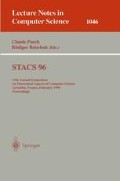Abstract
Let u, m≥1 be arbitrary integers and let k≥u. The central result of this paper is that the multiset H={itha,b¦0≤a, b<km} of functions from U=0,..., u }-1 to M={0,..., m −1, where h a,b (x)=((ax+b) mod km) div k, for x∈ U, is a (c, 2)-universal class of hash functions from U to M in the sense of Carter and Wegman [7, 25], with c=5/4. More precisely, we show that if x 1, x 2 are distinct elements of U and i 1,i 2∈ M are arbitrary, and if h is chosen at random from H, then ¦Prob (h(x 1)=i 1 ∧ h(x 2)=i 2-1/m2¦≤(1/2km)2≤1/4m 2. Among the many known constructions of (c, 2)-universal classes there was none that would get by with such a small number of pure integer arithmetic operations without the assumption that a prime number of size the order of¦U¦ or at least ¦M¦ was available. — Varying this result, we obtain: (a) two-independent sequences of random variables; (b) universal hash classes of higher degree (“(c, l)-universal” classes) and l-wise independent random variables, for l ≥ 2; (c) algorithms for static and dynamic perfect hashing with an optimal number of random bits; all using pure integer arithmetic without the need for providing prime numbers (arbitrary or random) of a certain size. It should be noted that the focus here is not on minimizing the size of the probability space used, as in much of the recent work on “almost k-independent random variables”, but on the realization of such variables or hash classes using the most natural and most widely available operations, viz., integer arithmetic.
Preview
Unable to display preview. Download preview PDF.
References
K. Abrahamson. Time-space tradeoffs for branching programs contrasted with those for straight-line programs. In Proc. of the 27th IEEE FOCS, pp. 402–409, 1986.
N. Alon, O. Goldreich, J.Håstad, and R. Peralta. Simple constructions of almost k-wise independent random variables. Random Structures and Algorithms, 3:289–304, 1992.
N. Alon, O. Goldreich, J. Håstad, and R. Peralta. Addendum to “simple constructions of almost k-wise independent random variables”. Random Structures and Algorithms, 4(1):119–120, 1993.
P. Beame, S.A.Cook, and H.J.Hoover. Log depth circuits for division and related problems. SIAM J. Comput., 15(4):994–1003, 1986.
B. Chor and O. Goldreich. On the power of two-point based sampling. J. of Complexity, 5:96–106, 1989.
T. H. Cormen, C. E. Leiserson, and R. L. Rivest. Introduction to Algorithms. MIT Press, Cambridge, Mass., 1990.
J. L. Carter and M. N. Wegman. Universal classes of hash functions. J. Comp. Syst. Sci., 18:143–154, 1979.
M. Dietzfelbinger, J. Gil, Y. Matias, and N. Pippenger. Polynomial hash functions are reliable. In W. Kuich, editor, Proceedings of 19th ICALP, pp. 235–246. Springer-Verlag, LNCS 623, 1992.
M. Dietzfelbinger, T. Hagerup, J. Katajainen, and M. Penttonen. A reliable randomized algorithm for the closest-pair problem. Research Report 513, Universität Dortmund, December 1993.
M. Dietzfelbinger, A. Karlin, K. Mehlhorn, F. Meyer auf der Heide, H. Rohnert, and R. E. Tarjan. Dynamic perfect hashing: Upper and lower bounds. SIAM J. Comput., 23(4):738–761, 1994.
M. Dietzfelbinger and F. Meyer auf der Heide. Dynamic hashing in real time. In J. Buchmann, H. Ganzinger, and W. J. Paul, editors, Informatik. Festschrift zum 60. Geburtstag von Günter Hotz, volume 1 of Teubner-Texte zur Informatik. B. G. Teubner, Stuttgart-Leipzig, 1992.
M. L. Fredman, J. Komlós, and E. Szemerédi. Storing a sparse table with O(1) worst case access time. J. Assoc. Comput. Mach., 31(3):538–544, July 1984.
G. H. Hardy, and E. M. Wright. An Introduction to the Theory of Numbers. Oxford Science Publications, Clarendon Press, Oxford, 1994.
R. M. Karp and A. Wigderson. A fast parallel algorithm for the maximal independent set problem. J. Assoc. Comput. Mach., 32(4):762–773, 1985.
N. Linial, M. Luby, M. Saks, and D. Zuckerman. Efficient construction of a small hitting set for combinatorial rectangles in high dimension. In Proc. of the 24th ACM STOC, pp. 258–267 1993.
M. Luby. A simple parallel algorithm for the maximal independent set problem. SIAM J. Comput., 15:1036–1053, 1986.
K. Mehlhorn. Data Structures and Algorithms 1: Sorting and Searching. Springer-Verlag, Berlin, 1984.
Y. Mansour, N. Nisan, and P. Tiwari. The computational complexity of universal hashing. Theoretical Computer Science, 107:121–133, 1993.
K. Mehlhorn and U.Vishkin. Randomized and deterministic simulations of PRAMs by parallel machines with restricted granularity of parallel memories. Acta Informatica, 21:339–374, 1984.
Y. Matias and U. Vishkin. On parallel hashing and integer sorting. J. Algorithms, 12:573–606, 1991.
N. Nisan. Pseudorandom generators for space-bounded computations. In Proc. of the 22nd ACM STOC, pp. 204–212, 1990.
J. Naor and M. Naor. Small-bias probabilitiy spaces: Efficient constructions and applications. In Proc. of the 22nd ACM STOC, pp. 213–223, 1990.
A. Siegel. On universal classes of fast high performance hash functions, their time-space tradeoff, and their applications. In Proc. of the 30th IEEE FOCS, pp. 20–25, 1989. Revised Version.
A. Schönhage and V. Strassen. Schnelle Multiplikation grosser Zahlen. Computing, 7:281–292, 1971.
M. N. Wegman and J. L. Carter. New classes and applications of hash functions. In Proc. of 20th IEEE FOCS, pp. 175–182, 1979.
A. Wigderson and O. Goldreich. Tiny families of functions with random properties: A quality-size trade-off for hashing. In Proc. of 26th ACM STOC, pp. 574–583, 1994.
A. Wigderson. The amazing power of pairwise independence. In Proc. 26th ACM STOC, pp. 645–647, 1994. (Invited lecture).
Author information
Authors and Affiliations
Editor information
Rights and permissions
Copyright information
© 1996 Springer-Verlag Berlin Heidelberg
About this paper
Cite this paper
Dietzfelbinger, M. (1996). Universal hashing and k-wise independent random variables via integer arithmetic without primes. In: Puech, C., Reischuk, R. (eds) STACS 96. STACS 1996. Lecture Notes in Computer Science, vol 1046. Springer, Berlin, Heidelberg. https://doi.org/10.1007/3-540-60922-9_46
Download citation
DOI: https://doi.org/10.1007/3-540-60922-9_46
Published:
Publisher Name: Springer, Berlin, Heidelberg
Print ISBN: 978-3-540-60922-3
Online ISBN: 978-3-540-49723-3
eBook Packages: Springer Book Archive

